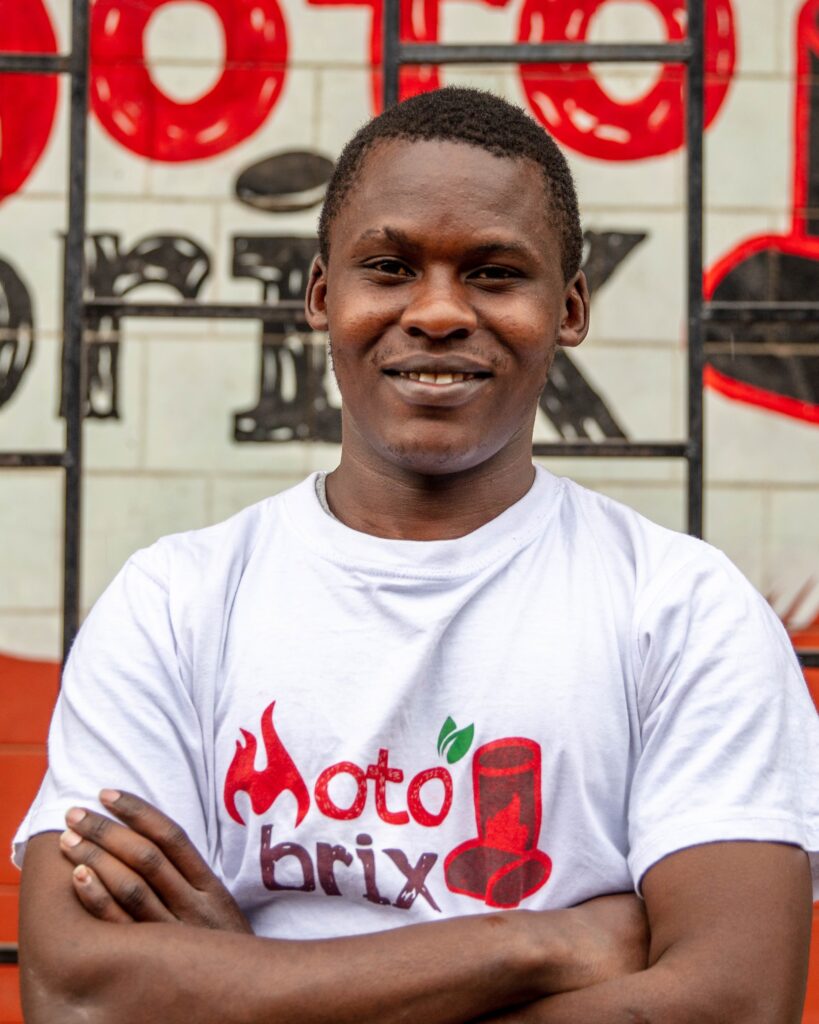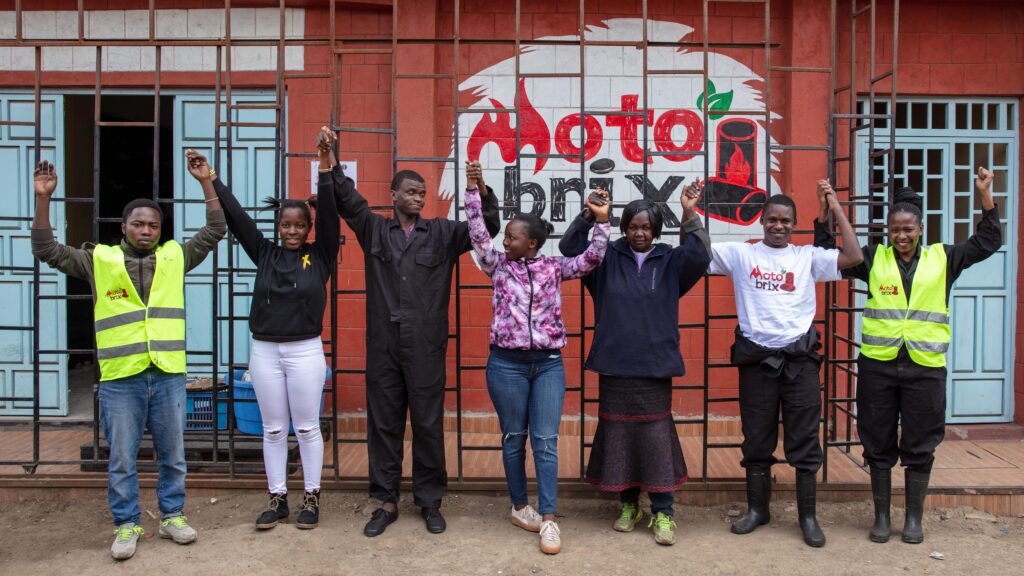Calvin Shikuku: A Young Kenyan Leader’s Journey Toward Sustainable Energy Solutions for All
 Calvin Shikuku is Chief Executive Officer at Motobrix Limited, a social enterprise with the primary goal of creating sustainable solutions that address energy challenges while making a positive impact on communities.
Calvin Shikuku is Chief Executive Officer at Motobrix Limited, a social enterprise with the primary goal of creating sustainable solutions that address energy challenges while making a positive impact on communities.
The Clean Cooking Alliance spoke to Shikuku about his current work on spearheading a social enterprise dedicated to the production of renewable energy from waste, as well as his role in empowering young people and engaging them in clean cooking.
This story is part of a series featuring youth leaders from across the clean cooking sector.
Clean Cooking Alliance (CCA): Tell us about your biggest professional achievements, as well as your future goals and aspirations.
Calvin Shikuku (Shikuku): One of my key achievements is launching and operationalizing Motobrix Innovation to act as a springboard for environmental solutions and support other young people’s ideas. Through innovative and strategic partnerships, we have been able to develop and distribute renewable energy solutions tailored for cooking; carry out community activities to promote clean cooking and environmental conservation; and support several youth-led ideas to build sustainable businesses by providing solutions to challenges they face in their communities. Looking ahead, my professional aspirations involve scaling our renewable energy projects to reach a wider audience and having an even greater societal impact.
CCA: What was your inspiration behind working in the energy sector and clean cooking?
Shikuku: I grew up in Mathare, which is the second largest informal settlement in Kenya. School feeding programs played a critical role throughout my life. I literally went to school because that was the only way I would eat. But running school feeding programs was often interrupted due to lack of suitable and affordable fuel. I wanted to change this. Years later, I am doing just that, providing an alternative fuel to keep the programs running and keep children in school.
CCA: How does your current work at Motobrix empower young people and amplify youth voices?
Shikuku: At Motobrix, we are deeply committed to empowering young people and actively involving them in the clean cooking sector. We have integrated several initiatives aimed at uplifting and amplifying youth voices. Notable aspects of our approach are our youth internship and mentorship programs. We provide opportunities for young individuals to join Motobrix and gain hands-on experience in renewable energy projects. Through mentorship, we ensure that these young talents not only contribute meaningfully to our initiatives but also have the chance to voice their perspectives and ideas. Motobrix also actively participates in forums, conferences, and campaigns where young advocates can voice their concerns and recommendations for policy changes in the renewable energy and clean cooking sectors.
As a result of these efforts, we have witnessed inspiring examples of youth empowerment within Motobrix. Members have contributed fresh and innovative ideas to our projects, bringing new perspectives to the table. Our commitment to youth empowerment goes beyond the immediate projects at hand; it’s about nurturing a generation of leaders who are passionate about sustainable practices and have the tools to drive meaningful change. We believe that, by uplifting youth voices, we contribute not only to the success of Motobrix but to the broader goal of creating a more sustainable and inclusive future for all.
CCA: What can be done to empower youth and ensure equal and meaningful representation and benefits for youth from marginalized and vulnerable groups?
Shikuku: Youth representation is crucial in all spheres including policy-making forums, industry events, research initiatives, entrepreneurial platforms, and educational institutions within the clean cooking sector. To empower youth meaningfully, key opportunities should include financial support through grants and scholarships, mentorship programs, internship and training opportunities, advocacy campaigns, and networking platforms. This multifaceted approach not only fosters innovation but also ensures diversity and inclusivity in shaping the future of the clean cooking sector.
Stakeholders need to be very deliberate in ensuring that youth are meaningfully engaged. They should develop tailored training programs addressing specific needs of marginalized groups, foster community partnerships to build trust and address unique concerns, establish mentorship programs connecting youth with experienced figures in the sector, and actively involve youth representatives from marginalized groups in decision-making processes to ensure equitable benefits and representation.
CCA: As a young leader in clean energy, can you share a pivotal lesson you learned that shaped your path and empowered you on your journey?
Shikuku: A pivotal lesson that profoundly shaped my path was the recognition that collaboration is key to driving meaningful change. Early in my journey, I realized that addressing complex challenges in the clean cooking sector requires diverse expertise and collective efforts. By actively seeking collaborations with fellow youth, experts, stakeholders, and like-minded individuals, I was able to leverage a wealth of knowledge and perspectives, propelling our initiatives forward.
CCA: What needs to be done to better understand young people’s needs, challenges, and aspirations in the clean energy and clean cooking sectors?
Shikuku: A multifaceted approach, including listening to the voices of young people, is essential. This could be enhanced through the establishment of youth advisory boards. Fostering partnerships with educational institutions, utilizing online platforms for engagement, promoting diversity and inclusion, encouraging research and innovation competitions, and collaborating with youth-led organizations can contribute to a holistic approach in capturing the diverse experiences and aspirations within the youth demographic while also involving them in the sector.
CCA: How do you envision the role of youth in shaping the future of the clean cooking sector in the next decade?
Shikuku: In the next decade, young leaders are poised to drive innovation in clean cooking technologies, introducing more efficient and sustainable solutions, and with it, job creation and economic empowerment. Their advocacy efforts will focus on raising awareness about the environmental impact of traditional cooking methods, influencing policies, and promoting behavioral change towards cleaner alternatives. Through global collaboration and knowledge exchange, the youth will connect with peers worldwide, fostering a shared vision for a more sustainable and inclusive future in the clean cooking sector.
CCA: What three pieces of advice would you offer to young individuals aiming to initiate change in the clean cooking sector and beyond?
Shikuku: Recognize the power of collaboration and embrace it. Engage with experts, organizations, and communities to harness collective wisdom and resources. Building partnerships not only accelerates progress but also fosters a supportive network that can sustain long-term impact.
Stay curious and adaptable. The clean cooking sector, like any field, is dynamic and constantly evolving. Stay curious, be open to learning, and adapt to emerging technologies and insights.
Follow your dreams passionately. You have all it takes, and the best time is now.

